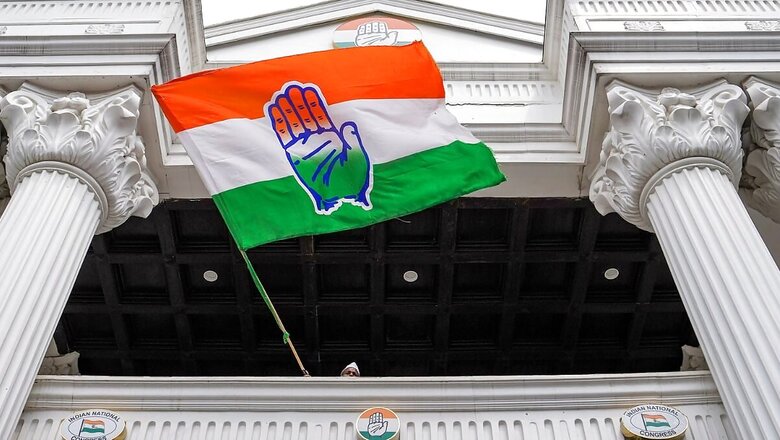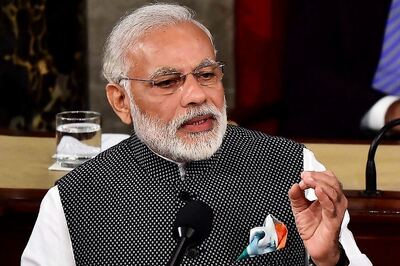
views
Congress’s Karnataka weep in the only state south of the Vindhyas, where the BJP held power, portends new implications for our larger polity.
Here are 10 takeaways from Congress’s big win in Karnataka:
Morale-booster for Congress: With a strong anti-incumbency sentiment against the ruling BJP in a state that hasn’t elected an incumbent to power in over three decades, the Congress was always expected to win Karnataka. But the scale of the victory – 136 seats with over 43 percent vote share and a 7 percent gap with the BJP – is a huge morale booster for the main national opposition party.
Control of a vital state: The Congress last beat the BJP in Himachal Pradesh in a head-to-head contest. But the political impact of the Karnataka win is higher. The state has the third highest GSDP (gross state domestic product) in India (after Maharashtra and Tamil Nadu). Winning control of such a prosperous and politically significant state is a big fillip to the Congress on the road to 2024.
Strong regional leadership matters: Karnataka is the one state where the Congress had a strong local leadership and party machinery. In Siddaramaiah, it had a pan-state leader with an appeal to a wider social coalition; in DK Shivakumar, a strong Vokkaliga powerhouse with organisational strengths; and in Mallikarjun Kharge, a pan-state Dalit leader who is also the national president. It has shown that when it gets its regional leadership together and focuses on local issues that matter to people, it can be a formidable machine.
Rahul Gandhi’s stock up: On the eve of the election results, Congress leader Jairam Ramesh told reporters that Rahul Gandhi had spent 23 days during the ‘Bharat Jodo Yatra’ in Karnataka and that the party’s road to victory in the state began with that journey. While local factors were paramount in Karnataka, Rahul Gandhi campaigned a fair bit in the state, especially towards the end of the campaign, and with a good strike rate. He has fronted the charge against the BJP nationally so far. This victory will be a confidence-booster for the Congress leader.
Bargaining power in opposition alliance: With efforts on for opposition unity ahead of the 2024 Lok Sabha elections, this result will strengthen the Congress’s hands and bargaining power as the pre-eminent national party opposing the BJP.
Campaign lessons for upcoming state elections: Karnataka will be followed by assembly elections in Madhya Pradesh, Rajasthan and Chhattisgarh later this year. While each contest is different and local politics in each state varies, it will look to replicate some of the lessons from this campaign. Campaign strategist Sunil Kanugolu, who micromanaged much of the campaign along with state leaders, can be expected to play a bigger role going forward.
DBT politics is here: The Congress did well in rural areas in this election, compared to the BJP. This is a big shift from 2018. The party has already said it will implement its four promises of Gruha Jyothi (200 units of free power), Gruha Lakshmi (Rs 2,000 to each woman head of a family), Anna Bhagya (10 kg of rice to those below the poverty line), Yuva Nidhi (Rs 3,000 a month to unemployed graduates and Rs 1,500 to unemployed diploma holders). It may be tempted to expand these promises to other states going forward, as part of its strategy to take on the BJP.
Narendra Modi’s popularity remains high: While the BJP has been trounced in this state contest, without Prime Minister Narendra Modi’s roadshow in Bengaluru towards the end of the campaign, the party’s poll tally may have been much worse. The BJP actually managed to increase its seats in the Greater Bengaluru region (from 11 in 2018 to 15 in 2023). This, in an election in which its tally went down in every other region in the state. In that sense, the prime minister’s campaigning in the end may have staved off a worse showing by the party.
Karnataka 2024 is a different story: Karnataka has historically voted differently in state and national elections over the past three decades. While the Congress will be greatly enthused by this win, it would be premature to extrapolate these results to the 28 Lok Sabha seats of Karnataka. A lot of politics remains between now and 2024 – in Karnataka and the rest of India.
(Nalin Mehta, an author and academic, is the dean of School of Modern Media at UPES University in Dehradun, a non-resident senior fellow, Institute of South Asian Studies at the National University Singapore, and group consulting editor, Network 18. He is the author of ‘The New BJP: Modi and the Making of the World’s Largest Political Party’)



















Comments
0 comment